|

Spring
1999 (7.1)
Oil Boom Period
in Azerbaijan
(1880s
- 1918)
Jalil Mammadguluzade
(1866-1932)
The Postbox
(1903)
A Short Story
Azeri
version
of the story
_____
"The Postbox" depicts the relationship between a landowner
and Noruzali, a poor, ignorant peasant. Noruzali's highest priority
is to please his Khan, even to the point of ridiculousness. Mammadguluzade
is playing with broad stereotypes here: the self-absorbed Khan
is only concerned about his own welfare (and amusement); the
backward peasant is completely out of touch with modern amenities,
including postboxes.
Mammadguluzade [pronounced mam-mad-gu-lu-ZAH-deh] was editor
of the satiric journal, "Molla
Nasraddin"
from 1906-1931. He and his wife are buried together in Baku's
Cemetery for the Honored Ones (Fakhri Khiyabani).
It was the 12th day of November. The weather was cold, but it
hadn't snowed yet. The doctor examined the Khan's ill wife. He
said that she had improved and that it would be possible to start
traveling in a week. The Khan was in a hurry to go to Yerevan
because he had some very important business matters to attend
to there.1 Also, he was afraid
that it would snow and then it would be impossible for his wife
to travel in the cold weather. He took up his pen and wrote to
his friend Jafar Agha [Mr. Jafar. Pronounced ah-GHA]:
"Next week I hope to arrive in Yerevan with my family. Could
you please make sure that the rooms where we'll be staying are
all warmed up and ready for us? Have the servants lay the rugs,
light the stoves and air the rooms. I want to make sure everything
will be comfortable for my wife, who is ill. Please reply by
telegram. I have taken care of the matter that you asked about.
Goodbye!
Sincerely,
Vali Khan"
  The Khan folded the
letter into an envelope, addressed and stamped it. He intended
to give it to his servant to drop in the postbox, but then remembered
he had already sent him out on another errand. The Khan folded the
letter into an envelope, addressed and stamped it. He intended
to give it to his servant to drop in the postbox, but then remembered
he had already sent him out on another errand.
Just then he heard someone at the gate. The Khan went out and
saw that it was Noruzali [pronounced no-ruz-a-LI] from the village
of Itgapan. Noruzali often came to see him and always brought
something such as flour, honey or butter. Again this time, Noruzali
had not come empty-handed.
As soon as he saw the Khan, he set his walking stick against
the wall, started to open the gate and pushed the donkey with
the load on its back inside. Then he took three to four chickens
from off the donkey's back. He untied the load, placing a few
sacks on the ground. Then he raised his eyes to look at the Khan
and bowed low in greeting.
All sketches: Molla
Nasraddin Magazine -
Early 20th Century
Poking fun at the complicated Arabic script. Mid 1920s.
"Why do you go to all this trouble, Noruzali?"
"It's no trouble at all, my lord. I am your faithful servant
until the day I die," the peasant replied, brushing the
dust off his clothes.
As it was nearly one o'clock in the afternoon when the mail would
go out, the Khan asked, "Noruzali, do you know where the
Post Office is?"
"I'm a villager, how would I know where the Post Office
is?"
"Do you know where the Central Courthouse is?"
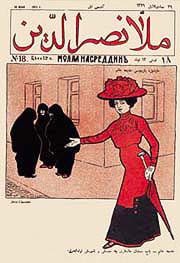  "Yes, my dear lord,
of course I know where it is. I went there last week to complain
to the Chief of the Courthouse because the mayor of our village
is tormenting us. To tell you the truth, our mayor is originally
from another village, "Yes, my dear lord,
of course I know where it is. I went there last week to complain
to the Chief of the Courthouse because the mayor of our village
is tormenting us. To tell you the truth, our mayor is originally
from another village,
and that's why he hates us. Last week two of my calves disappeared.
So I went there..."
"Hold on. You can tell me the rest of the story later. Listen
carefully, there's something I want to tell you. There's a building
across the street from the Courthouse, and on the wall there's
a box. That's the Postbox. It has a long, narrow lid. Go there,
lift the lid, drop the letter inside and come back right away!"
Noruzali carefully took the letter. First he looked at the Khan,
then he looked at the letter again with terrified eyes. He went
towards the door and bent down to put the letter on the ground.
Left: Contrasting traditional
customs with Western customs. Molla Nasraddin magazine.
The Khan shouted, "Don't put it there! It'll get dirty.
Go put it in the box right away and come back."
"Khan, my dear Khan, let me hang a bag of oats around the
mule's neck. He's come a long way and he's probably tired and
hungry."
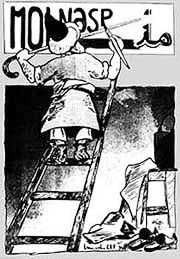  "No, not now. It
can wait a while. You'll miss the mail. You can feed him when
you get back. "No, not now. It
can wait a while. You'll miss the mail. You can feed him when
you get back.
Photo:Latin script replaces
Arabic script. 1929. Molla Nasraddin
magazine.
"All right. Then let me just tie him up. I'm afraid he'll
eat all the trees in the yard if I leave him untethered."
"No, no. That's OK. Hurry! Go as fast as you can! Go put
the letter in the box and come back!"
Noruzali put
the letter inside his jacket.
"My dear Khan, these chickens are still tied up. Poor animals,
let me untie them and give them some grain."
Noruzali put his hand in his pocket to get some grain, but the
Khan screamed even louder, "No, no! Later, after you've
come back!"
Noruzali took his walking stick and started to run like a little
child. Then he remembered something else, turned and again pleaded
with the Khan, "Khan, there are eggs in one of the sacks.
Be careful with them. I'm afraid that the donkey will lie down
on them and break them."
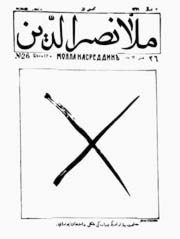 
The Khan shouted even more loudly, "Stop talking! We're
losing time."
Just as Noruzali was about to leave, the Khan called him back.
"Noruzali, don't give the letter to anyone. Don't show it
to anyone. Put it in the box and come back right away! Understand?"
"I'm not a child! I'm not as inexperienced as you think.
Don't worry, even the mayor wouldn't be able to take this letter
away from me."
Noruzali disappeared after saying these words.
The Khan went back into the house and spoke tenderly to his wife,
"Well, Light of my Eyes, start getting ready. I wrote a
letter to Yerevan so that they'll warm up the rooms. We can go
now. You're looking better now, thank God. The doctor says a
change of climate will do you good."
Illustration
above: Censored
graphics of front page replaced with "X". Molla Nasraddin
magazine - 1920s .
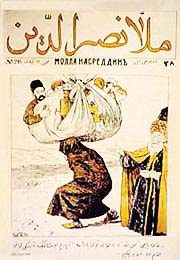  As the Khan was speaking
to his wife, his servant came in and said, "Khan, whose
donkey is in the yard? Who brought those things?" As the Khan was speaking
to his wife, his servant came in and said, "Khan, whose
donkey is in the yard? Who brought those things?"
The Khan replied, "Put those things away! Noruzali brought
them from Itgapan village."
The servant took the chickens and eggs to the kitchen and led
the donkey off to the stable. Then he opened one of the sacks
with flour, took a pinch of it and showed it to the Khan, "This
is quality flour."
The Khan looked at the flour and told his servant to start baking
the bread.
Photo:
Molla Nasraddin
magazine - strong advocate of women's rights. 1920s.
Two hours later after he had finished eating the bread, the Khan
remembered Noruzali and the letter. He summoned his servant,
but was told that Noruzali had not come back yet. The Khan was
surprised that it was taking him so long. Perhaps Noruzali had
put the letter in the postbox and then gone to the bazaar to
buy something to eat. Another hour passed, but Noruzali didn't
come back.
Finally the Khan called for his servant to go find out what had
happened to him. Half an hour later, the servant returned saying
that Noruzali was nowhere to be found.
The Khan went out on the balcony and lit a cigarette. He paced
up and down the balcony wondering what had happened.
Just then, a policeman dropped by. "Khan, the police chief
wants you to come to the police station and bail out your village
countryman. If you don't, the chief is going to put him in prison."
The Khan gazed at the man in astonishment. Then he replied, "That
villager is such a meek person. What could he possibly have done
to get arrested?"
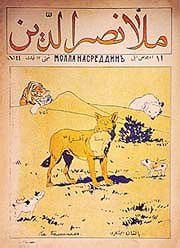  "I don't know exactly
what happened. It would be better if you went to the police station
yourself." "I don't know exactly
what happened. It would be better if you went to the police station
yourself."
The Khan got dressed and said nothing to his wife so as not to
worry her. Before entering the police station, he looked inside
the jail cell and saw Noruzali sitting in a corner along with
the other prisoners. He was crying like a child, wiping his tears
away with the hem of his chukha.2
After the Khan found out what had happened and vouched for Noruzali,
the two of them went back to the Khan's place. Noruzali gave
some feed to his donkey, sat down against the wall and started
crying again.
The Khan went into the house, lit a cigarette, went out on the
balcony and called to Noruzali, "Now tell me what happened,
Noruzali! Your story sounds very interesting. Someone could write
a book about it. Tell me every detail. Start from the beginning
when I gave you the letter, and tell me how you ended up in prison."
Illustration:
Azerbaijan
as victim (hare) trapped by wild animals (neighbors). Molla Nasraddin
magazine. 1920s.
Noruzali got up and moved closer to the Khan and said, after
wiping his tears on his coat, "My dear Khan, forgive me!
I am not to blame. I'm just a poor, ignorant peasant from the
village. How am I supposed to know about letters, postboxes and
post offices? Forgive me, Khan, I beg you. Let me make up for
all this trouble. There's no way to undo everything I've done.
It must have been God's will. Forgive me, Khan. I'll be your
faithful servant until the day I die..."
Noruzali came closer and bent down to kiss the Khan's feet.
"Don't make such a big deal out of it, Noruzali. Am I accusing
you of anything? Have you done anything wrong to me? So then
why should I forgive you?"
"Ah, Khan, you don't know the half of it. That infidel,
3
the son of an infidel took your letter, put it in his pocket
and walked off with it.
"Who put the letter in his pocket and went away?"
"That stranger, that Russian guy!"
"Where did he take it?"
"He went into that building you told me about, the one with
the box in front. He went inside that building."
The Khan was silent for a moment.
"Didn't you put the letter inside the box?"
"Of course I did! That stranger opened the box somehow and
took the letter out as soon as I put it in."
"Were there any other letters inside that box beside ours?"
"Yes, plenty of them. He stole them all."
The Khan started to laugh very loudly. "No, Noruzali, tell
the whole story - everything from start to finish exactly as
it happened, from start to finish."
"Khan, my dear Khan, I took the letter from you and went
to the Central Courthouse building. I found the building you
were telling me about and I also found the box. I opened its
lid and wanted to put the letter inside it, but then I stopped.
I looked at the letter first, then I looked at the box. To be
honest, I was afraid that you would get angry with me. I didn't
know what to do, whether to put the letter in or not, because
I had forgotten to ask you if I should stay near the box after
putting the letter in or if I should come back home. I thought,
if I put it in and stayed near the box, then I would have to
stay until evening.
But as you saw
for yourself, my dear Khan, I left the poor donkey hungry and
also left the chickens with their legs tied up. I brought some
flour as well. And it's still here in the yard. Khan, let your
servant and me take the sacks inside the house. I'm afraid that
it will rain and the flour will get wet."
"No, Noruzali, don't worry about them...Tell me, tell me,
what's the rest of the story?"
"So I didn't put the letter in the box. I closed the lid
and walked away for a little while. At first I wanted to come
and ask you, but then I was scared that you would get angry with
me. I was afraid that you'd say that Noruzali was like an animal,
like a donkey, that doesn't understand anything. So I leaned
against the wall to rest. Then I saw an Armenian boy, about this
tall, about 12 or 13. He went up to the box, opened the lid,
put a letter inside it exactly like the one you gave me, then
closed the lid and went away. I called after him to ask why he
put the letter in the box, but he didn't answer. I don't know-maybe
he didn't understand me. Anyway he didn't look back.
"A few minutes later, a Russian lady rushed up to the box,
put a letter in and left. This time I got brave. I thought to
myself that this is probably the way it has to be, that the letters
should stay in the box. So I got brave. Having said 'bismillah,'
4
I went and opened the lid of the box, put the letter inside and
turned around to come back to your service.
"When I was about this far from the box, that Russian guy
went up to it. At first I thought that he wanted to put a letter
inside the box, too. But then I saw that no, he wanted to do
something else. He put his hand inside the box. I understood
right away that he wanted to steal the letters...Khan, I'm speaking
too much, forgive me, tell your servant to help me get on my
way home, it's getting late."
"No, I won't let you go yet. Tell me what happened after
that."
"Well, my dear Khan, may my children be your servants! May
I never live another day without your blessing! Well, I saw this
guy taking the letters out of the box. He closed the lid and
was about to leave. I ran over to him and made him stop. I said,
'Hey you, where are you taking those letters? You think people
put their letters in there for you to steal them? Put them back!
Noruzali isn't dead yet, and he won't let you steal a letter
his Khan gave him. Don't take something that doesn't belong to
you. Don't your Russian laws say that stealing is a sin?' Khan,
may my children be your servants. Khan, let me go home-it's getting
late."
"Don't hurry, you can go later...What happened after that?"
"Let me think, where was I...Hey, don't let the donkey destroy
the grapevine."
Noruzali wanted to stop the donkey, but the Khan didn't let him.
"Noruzali, don't go, don't go yet. Tell me, what happened
then?"
"What happened? I begged the guy, telling him that my Khan
would kill me if he took the letter away. I told him to give
back my Khan's letter. He said no, he wouldn't give it back.
Then I saw that he wanted to run away. God knows how furious
I was-I took the guy by the shoulders and shoved him to the ground
so hard that he started bleeding at the mouth. Then some soldiers
came from the Courthouse, beat me up and took me to prison. May
I be your servant forever, my Khan! If it weren't for you, they
would have sent me to Siberia. There were some other prisoners
in there besides me, and they told me that the Russian guy was
an official. Well...what should I have done? Khan, tell me, I'm
not to blame, am I?"
The Khan just laughed and laughed.
It was already dark outside. Noruzali put the empty sacks on
the back of his hungry donkey and, beating the donkey with a
stick, headed back to his village.
In three days, a telegram came from Yerevan for the Khan. It
said, "Received your letter. Rooms are ready." And
so the Khan and his wife set out for Yerevan shortly afterwards.
After a month and a half, Noruzali was summoned to court and
sentenced to three months in prison for having assaulted a civil
servant who was carrying out his duties. Noruzali pleaded innocent.
The Khan learned about this latest development three months later.
It made him stop to think for a while.
Footnotes:
1 Yerevan - At the turn of the 19th century, more
Azerbaijanis were living in Yerevan than were Armenians. In this
story, the Khan lived in Shusha, the primary city of the Nagorno-Karabakh
region, which is presently occupied by Armenian military forces.
Up
text.
2
Chukha - a type of long-waisted coat that used to be worn in
the Caucasus. Up
text
3
Infidel here refers to a person who is not a Muslim. Up text
4
Bismillah - God have mercy, God help me. Up text
Translated
by Vafa Talyshly
From
Azerbaijan
International
(7.1) Spring 1999.
© Azerbaijan International 1999. All rights reserved.
|






